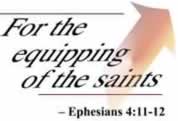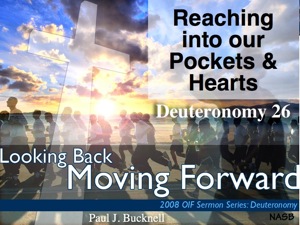
Deuteronomy 26
The Bible Teaching Commentary
Reaching into our Hearts & Pockets
Paul J. Bucknell
Introduction (1-19) | A. Thankful (1-11) | B. Kind (12-15)| C. Be Committed (16-19) | Podcast
Purpose: Deuteronomy 26:1-11 What great things has the Lord done in your lives? Do you remember? Being thankful is the first characteristic that God shapes into His people's lives by having them remember His wonderful grace to them in bringing them into the land. This is the second of four Living Commentary messages on Deuteronomy 26 that draw us closer to God.
Each of the three paragraphs of Deuteronomy 26 highlight a special way that God cultivated the best lives for the Israelites. They will not sound unfamiliar for they are the same that we read in the New Testament. We will discuss the first one in this article.
- Being Thankful shapes our affection for God (Dt 26:1-11)
- Being Kind helps others in need (Dt 26:12-15)
- Being Committed determines the welfare of our lives (Dt 26:16-19)
A) Being Thankful Shapes our Affection for God (Dt 26:1-11)
Once God's people get to the land, they are to be careful to do one thing. This is not one of those laws that they need to do every month or year, but just once. How many dedications do you have for a building? Just one. This is what is happening here in verses 26:1-11.
This is the importance of dedications. You summarize the history, purpose and are able to give rightful recognition to those who have contributed to the project, in this case God.
1) The Offering (Deuteronomy 26:1-2)
"Then it shall be, when you enter the land which the LORD your God gives you as an inheritance, and you possess it and live in it, that you shall take some of the first of all the produce of the ground which you shall bring in from your land that the LORD your God gives you, and you shall put it in a basket and go to the place where the LORD your God chooses to establish His name" (Deuteronomy 26:1).
God did not ask much from the Israelites regarding the law. They only needed to bring a basket of the first things they harvested in the land. 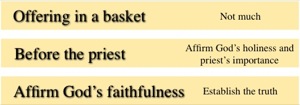 We need to remember that while God was leading the Israelites into the Promised Land, He was providing their food for them. He was leading them off one kind of welfare system to another. While wandering through the deserts, God provided manna from the sky. They only needed to collect, prepare and cook it. Once they were in the land, the manna stopped.
We need to remember that while God was leading the Israelites into the Promised Land, He was providing their food for them. He was leading them off one kind of welfare system to another. While wandering through the deserts, God provided manna from the sky. They only needed to collect, prepare and cook it. Once they were in the land, the manna stopped.
"And the manna ceased on the day after they had eaten some of the produce of the land, so that the sons of Israel no longer had manna, but they ate some of the yield of the land of Canaan during that year" (Joshua 5:12).
One might wonder why doesn't God provide manna for all His people all the time (more one manna)? That way, everyone will want to be His people and everyone be fed. The reasoning seems right, but God refuses to do it that way. He has prepared something better!
The Lord has prepared a world full of wonderful things to taste, smell and eat. He wants people to interact with it by gathering its produce from trees, plants and animals that He has made. As we eat these things, we share in God's goodness. In one sense, all these things are as much miraculous as the manna. How does this seed grow and produce not only edible but pleasing things from the dirt? God does it. God made this DNA. Imagine a program that would do such things. That person would be an instant blessing. That person is God. Miracles that we experience each day are not counted miraculous not because they are not in every way special but because it is common and expected.
2) The Priest(Deuteronomy 26:3-4)
They are to take the basket of first produce and bring it before their local priest.
"You shall bring in from your land that the LORD your God gives you, and you shall put it in a basket and go to the place where the LORD your God chooses to establish His name… "Then the priest shall take the basket from your hand and set it down before the altar of the LORD your God." (Deuteronomy 26:3-4).
The reason they needed to go to the place where God designated is that the Lord only revealed Himself in one place, not as we are familiar with now under the New Covenant. Later that place would be Jerusalem. Everyone that wanted to worship the Lord must go there. They couldn't just make the offering anywhere nor could they do it on their own. They needed to go through a priest.
This is due to God's holiness. Man cannot freely come before God without a priest. He is holy. Nothing we bring before Him would be acceptable. This is the reason a priest is necessary to function in between God and man. In the New Covenant Jesus Christ is our High priest. All our offerings and prayers go through Him. He might be out of sight but He is very much the key part of our worship.
3) Affirm God's faithfulness (Deuteronomy 26:3)
Notice what they are to say to their local priest. Along with the offering, they need to proclaim aloud,
"And you shall go to the priest who is in office at that time, and say to him, 'I declare this day to the LORD my God that I have entered the land which the LORD swore to our fathers to give us.'" (Deuteronomy 26:3).
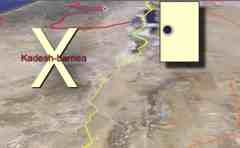 They were never to forget the wonderful works of the Lord. The details of the momentous event will be highlighted later on, but this simple declarative statement is powerful.
They were never to forget the wonderful works of the Lord. The details of the momentous event will be highlighted later on, but this simple declarative statement is powerful.
Right now they were on the east side of the Jordan (see map). They had not yet crossed over into the Promised Land. They had been wandering for forty years, but now they are at a second Kadesh-Barnea. They are covenanting with the Lord on what they will do after they reach that land. We should remember that the task before them is rather impossible. The Israelite spies themselves said that it was impossible due to the giants and walled cities. From man's perspective, the task to occupy Canaan no doubt was impossible.
This was not God's concern. This was the easy part for God. The hard part was to preserve a spirit of thankfulness and respect for God and His ways. This is always the case.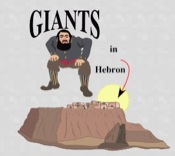 Even for Nehemiah, building the infrastructure, the walls, was easy compared to building a God-fearing people. In many cases like in Jesus' times, there was an infrastructure that got in the way of reaching the hearts of the people. The Jewish leaders put Jesus to death.
Even for Nehemiah, building the infrastructure, the walls, was easy compared to building a God-fearing people. In many cases like in Jesus' times, there was an infrastructure that got in the way of reaching the hearts of the people. The Jewish leaders put Jesus to death.
Most of those who do research on biblical events do not believe the Bible. They assume that Israel never came out of Egypt and never went into the Promised Land. Historical revisionism is live and well and for this reason alone we can see why it is so important to mark down important spiritual events so that we will never forget what really happened. This will be done in the next set of verses.
4) Get the Story Right (Deuteronomy 26:5-11)
After the priest takes the basket of offerings, the worshiper is to say something else, much longer this time. They are stating what really happened. Biblical history is history. All the events happened as stated. We are looking back with the aid of God's Word.
"And you shall answer and say before the LORD your God, 'My father was a wandering Aramean, and he went down to Egypt and sojourned there, few in number; but there he became a great, mighty and populous nation. And the Egyptians treated us harshly and afflicted us, and imposed hard labor on us. 'Then we cried to the LORD, the God of our fathers, and the LORD heard our voice and saw our affliction and our toil and our oppression; and the LORD brought us out of Egypt with a mighty hand and an outstretched arm and with great terror and with signs and wonders; and He has brought us to this place, and has given us this land, a land flowing with milk and honey. 'And now behold, I have brought the first of the produce of the ground which Thou, O LORD hast given me" (Deuteronomy 26:6-10).
There are five outstanding events that together summarize the arrival of God's people in the Promised Land.
-
Wandering Aramean
Their father was a wandering Aramean. We should not forget that Jacob spent many of his years wandering about, many of them not even in Israel. He was not famous or great, quite the contrary. (Read more on Jacob).
-
Few in Number
Jacob and his family were only seventy in number when they descended into Egypt. One would expect them to be swallowed up but instead they grew into a great populace of at least 3 million people.
-
Oppressed by Egyptians
They were oppressed by Egyptians, the then leading world power, but God set them free once they cried out for Him to save them.
-
Wonderfully delivered from Egypt
When God delivered them, He did it with great fanfare that still is the theme of great movies and stories today.
-
Provided a new home
Lastly, from the future perspective of the Israelites in Deuteronomy, they were to inherit the land flowing with milk and honey, speaking of its desirability.
They were to state all of these things because they were true. Details are important when recording what was earlier stated a summary statement.
Each item pointed to the impossibility of the Israelites getting to where they would soon be. An infamous scoundrel would become the father of a nation by nothing but God's grace. God does these things to show off His power, remind us of our lowly condition and cause a great joy to rise up in the heart of His people. Paul the apostle records the same thing in Ephesians 2:1-10, where he describes the believer spiritually dead to be seated on the right hand of God in Christ.
5) Worship before the Lord
"And now behold, I have brought the first of the produce of the ground which Thou, O LORD hast given me.' And you shall set it down before the LORD your God, and worship before the LORD your God; and you and the Levite and the alien who is among you shall rejoice in all the good which the LORD your God has given you and your household" (Deuteronomy 26:10-11).
Worship would follow the offering and the two statements. The word 'worship' literally means bow low and prostrate oneself before God. Unfortunately, Christians in many countries for the most part do not practice this today. This emphasis on alien certainly frames God's desire to reach people from all the nations. His idea to eliminate the Canaanites was not due to their persons but their evil lives. He welcomes those from around the world to join in worship at His feet.
"You shall rejoice in all the good which the LORD your God has given you!"
God wanted this to be a celebrated occasion. They were together with the Levites and aliens praise God. Their focus was on God's goodness. These verses will appear strange to some who are not familiar with the Old Testament but have their stereo-typed ideas. God is not imaginative. He is for the truth of what actually happened. God is not some legalistic authoritarian but full of joy. God does not want to keep the joy to Himself but desires to share that joy with His people.
Summary: Cultivating Thankfulness
God's purpose is to cultivate thankfulness in our lives. We can see this in review as we dwell on three major points.
-
Sharpened perspective
Without rightly thinking of the events in the world, we cannot properly live godly lives.
-
God's faithfulness
A strong belief in God's faithfulness is necessary for a steady growing life.
-
Dependence on God
If we understand all goodness comes from God, then we will continually seek His face.
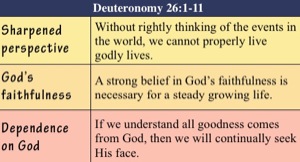
Being thankful is one step closer to God. Being kind is the second way that we reflect the glory of God on the earth. Next->
Next -> Being Kind helps others in need (Deuteronomy 26:12-15)




